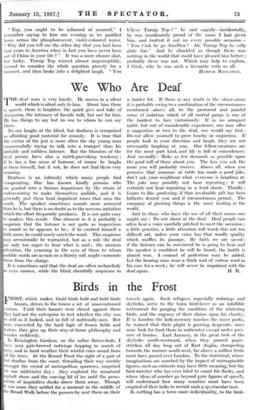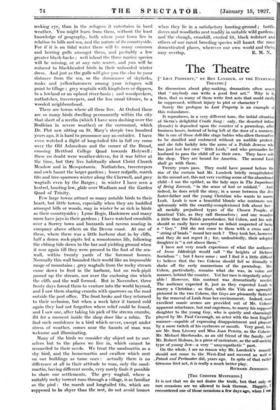Birds in the Frost
1ROST, which makes timid birds bold and bold birds brazen, drives to the towns a set of unaccustomed isitors. Until their haunts were closed against them hey had not the enterprise to test whether the city was o arid as it looked, and so full of unfriendly men. But ow, converted by the hard logic of frozen fields and raters, they give up their stay-at-home philosophy and yonder reekkssly.
In Kensington Gardens, on the softer flower-beds, I mare seen pale-browed redwings hopping in search of rev, and in hard weather their 'wistful cries sound from ll the trees. At the Round Pond the sight of a pair of ost dunlins from the coast, threading their way nimbly mongst the crowd of metropolitan sparrows, surprised me one midwinter day ; they explored the unnatural sphalt shore and the curving lid of ice until the perse- ution of inquisitive ducks drove them away. Though t was noon -they settled for a moment in the middle of he Broad' Walk before the passers-by sent them on their travels again. Such refugees, especially redwings and skylarks, serve to the town bird-lover as an infallible instrument for gauging the condition of the wintering birds, and the urgency of their claims upon his charity. If in London the lark-mercury touches the inner parks, be warned that their plight is growing desperate, since none look for food there in midwinter except under pres- sure of famine. Last January, in the great trek of the skylarks south-westward, when they poured panic- stricken all day long out of East Anglia, stampeding towards the warmer south-west, far above a million birds must have passed over London. To the statistical, whose imaginations are numbed by the impact of unimaginable figures, such an estimate may have little meaning,.but the bird-watcher who has ever tried to count his flocks, and whose ideas of number go beyond pure figures of speeel, will understand' how many counties must have been emptied of their larks to recruit such a spectacular host.
In nothing has a town more individuality, to the bird- seeking. eye, than in the refugees it entertains in hard weather. You might learn from them, without the least knowledge of geography, both where your town lies in relation to hills and sea, and the nature of its countryside. For if it is on tidal water there will be many common and herring gulls amongst them, and probably a few greater black-backs ; well inland the three marine species will be missing, or at any rate scarce, and you will be reduced to blackheaded birds in their unhooded winter dress. And just as the gulls will give you the clue to your distance from the sea, so the dominance of skylarks, rooks and yellowhammers among your refugees will point to tillage ; grey wagtails with kingfishers or dippers, to a lowland or an upland river-basin ; and woodpeckers, nuthatches, treecreepers, and the less usual titmice, to a wooded neighbourhood.
There are towns where all these live. At Oxford there are so many birds dwelling permanently within the city that short of a merlin (which I have seen dashing over the Bodleian in severe weather) or the cormorant, which Dr. Plot saw sitting on St. Mary's steeple two hundred years ago, it is hard to pronounce any an outsider. I have even watched a flight of long-tailed tits in full cry come over the Old Ashmolean and the corner of the Broad, crossing Hertford College Quad towards Holywell: these no doubt were weather-driven, for it was bitter at the time, but they live habitually about Christ Church Meadow and in Mesopotamia. Nuthatches, treecreepers and owls haunt the larger gardens ; lesser redpolls, marsh .tits and tree-sparrows winter along the Cherwell, and grey wagtails even by the Barges ; in . winter I have seen a kestrel, hunting low, glide over Wadham and the Garden Quad of Trinity.
Few large towns attract so many notable birds to their heart, but little towns, especially when they are huddled amongst hills or woods, may in winter be as rich in birds as their countrysides ; Lyme Regis, Haslemere and many more have jays in their gardens ; I have watched crossbills over a Surrey town and buzzards and ravens soaring in company above others on the Devon coast. At one of these, where there was a little harbour shut in by cliffs, half a dozen rock-pipits led a monotonous life, following the ebbing tide down to the bar and yielding ground when it rose again till they were pressed to the foot of the sea- wall, within twenty yards of the foremost houses. Normally this wall bounded their world like an impassable _range of mountains ; grey .wagtails from the rocky stream came down to feed in the harbour, but no . rock-pipit passed up the stream, nor over the enclosing rim which the cliffs and the wall formed. But in November, three frosty days forced them to venture into the world beyond, and I saw them sharing crumbs with sparrows on the road outside the post office. The frost broke and they returned to their seclusion, but when a week later it turned cold again they had not forgotten where relief could be found, and I saw one, after taking his pick of the strewn crumbs, flit for a moment inside the shop door like a robin. To find such confidence in a bird which never, except under stress of weather, conies near the haunts of man was welcome and illuminating.
Many of the birds we consider shy object not to our- selves but to the places we live in, which cannot be reconciled to their needs. We treat. the sandmartin as a shy bird, and the housemartin and swallow which nest on our buildings as tame ones : actually there is no difference at all in their attitude to man, only the sand- martin, having different needs, very rarely finds it possible to share our settlements. The grey wagtail, where a suitably rocky torrent runs through a village, is as familiar as the pied : the marsh and longtailed tits, which are supposed to be shyer than the rest, do not avoid houses when they lie in a satisfactory hunting-ground; turtle. doves and woodlarks nest readily in suitable wild gardens ; and the choUgh, crossbill, crested' tit, black redstart and others of our rarest breeding species will haunt the most domesticated places, wherever our own world and theirs



































 Previous page
Previous page